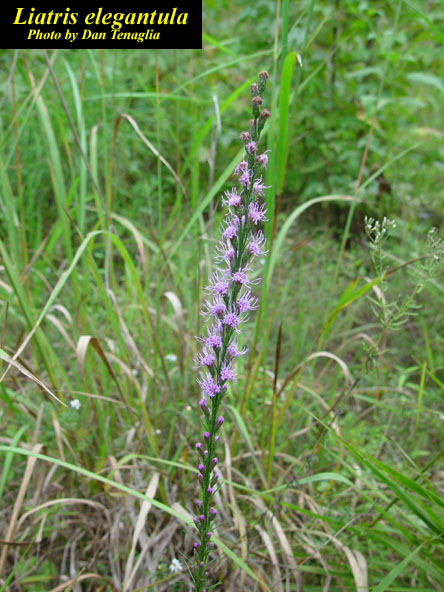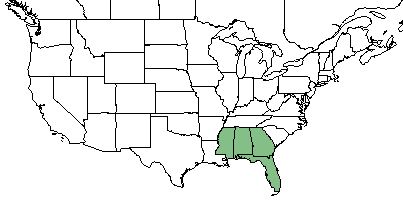Difference between revisions of "Liatris elegantula"
Emmazeitler (talk | contribs) (→Taxonomic Notes) |
HaleighJoM (talk | contribs) (→Ecology) |
||
| (8 intermediate revisions by 3 users not shown) | |||
| Line 1: | Line 1: | ||
{{italic title}} | {{italic title}} | ||
| − | Common name: shaggy blazing star <ref name= "USDA Plant Database"/> | + | Common name: shaggy blazing star<ref name= "USDA Plant Database"/> |
<!-- Get the taxonomy information from the NRCS Plants database --> | <!-- Get the taxonomy information from the NRCS Plants database --> | ||
{{taxobox | {{taxobox | ||
| Line 25: | Line 25: | ||
==Description== | ==Description== | ||
<!-- Basic life history facts such as annual/perrenial, monoecious/dioecious, root morphology, seed type, etc. --> | <!-- Basic life history facts such as annual/perrenial, monoecious/dioecious, root morphology, seed type, etc. --> | ||
| − | ''L. elegantula'' is a perennial forb/herb of the ''Asteraceae'' family native to North America. <ref name= "USDA Plant Database"> USDA Plant Database [https://plants.usda.gov/core/profile?symbol=LIEL7 https://plants.usda.gov/core/profile?symbol=LIEL7] </ref> | + | ''L. elegantula'' is a perennial forb/herb of the ''Asteraceae'' family native to North America.<ref name= "USDA Plant Database"> USDA Plant Database [https://plants.usda.gov/core/profile?symbol=LIEL7 https://plants.usda.gov/core/profile?symbol=LIEL7] </ref> |
==Distribution== | ==Distribution== | ||
| − | ''L. elegantula'' | + | ''L. elegantula'' ranges from Georgia, south to northern peninsular Florida, and west to Mississippi.<ref name="weakley">Weakley, A.S. 2015. Flora of the southern and mid-atlantic states. Working Draft of 21 May 2015. University of North Carolina at Chapel Hill, Chapel Hill, North Carolina.</ref> |
==Ecology== | ==Ecology== | ||
===Habitat=== <!--Natural communities, human disturbed habitats, topography, hydrology, soils, light, fire regime requirements for removal of competition, etc.--> | ===Habitat=== <!--Natural communities, human disturbed habitats, topography, hydrology, soils, light, fire regime requirements for removal of competition, etc.--> | ||
| − | ''L. elegantula'' is found in sandhills and other dry woodlands. <ref name= "Weakley 2015"> Weakley, A. S. (2015). Flora of the Southern and Mid-Atlantic States. Chapel Hill, NC, University of North Carolina Herbarium. </ref> Specimens have been collected from drying sand of open pine oak woodland, red clay soils, burned pineland, hardwood stand, peat of savanna, pine flatwoods, limestone glade, broom sedge old fields, longleaf pine wiregrass savanna, sandy old field, borders of hardwood hammock, and on bank of river.<ref name = "FSU herbarium"> URL: http://herbarium.bio.fsu.edu. Last accessed: June 2018. Collectors: Loran C. Anderson, R.K. Godfrey, K.E. Blum, R. Laxor, A.F> Clewell, S.W. Leonard, Gary Knight, W.G. D'Arcy, Angus Gholson, Wilson Baker, Richard Mitchell, J.P. Gillespie, V. I. Sullivan, Ann Johnson, MacClendons, Geo. Wilder, Paul Redfearn. States and counties: Florida (Wakulla, Madison, Jackson, Leon, Jefferson, lafayette, Clahoun, Gadsden, Levy, Taylor, Dixie, Nassau)</ref> | + | ''L. elegantula'' is found in sandhills and other dry woodlands.<ref name= "Weakley 2015"> Weakley, A. S. (2015). Flora of the Southern and Mid-Atlantic States. Chapel Hill, NC, University of North Carolina Herbarium. </ref> Specimens have been collected from drying sand of open pine oak woodland, red clay soils, burned pineland, hardwood stand, peat of savanna, pine flatwoods, limestone glade, broom sedge old fields, longleaf pine wiregrass savanna, sandy old field, borders of hardwood hammock, and on the bank of a river.<ref name = "FSU herbarium"> URL: http://herbarium.bio.fsu.edu. Last accessed: June 2018. Collectors: Loran C. Anderson, R.K. Godfrey, K.E. Blum, R. Laxor, A.F> Clewell, S.W. Leonard, Gary Knight, W.G. D'Arcy, Angus Gholson, Wilson Baker, Richard Mitchell, J.P. Gillespie, V. I. Sullivan, Ann Johnson, MacClendons, Geo. Wilder, Paul Redfearn. States and counties: Florida (Wakulla, Madison, Jackson, Leon, Jefferson, lafayette, Clahoun, Gadsden, Levy, Taylor, Dixie, Nassau)</ref> |
| − | + | ||
| + | ===Phenology=== <!--Timing off flowering, fruiting, seed dispersal, and environmental triggers. Cite PanFlora website if appropriate: http://www.gilnelson.com/PanFlora/ --> | ||
| + | ''L. elegantula'' flowers from August through November.<ref name="weakley">Weakley, A.S. 2015. Flora of the southern and mid-atlantic states. Working Draft of 21 May 2015. University of North Carolina at Chapel Hill, Chapel Hill, North Carolina.</ref> | ||
<!--===Seed dispersal===--> | <!--===Seed dispersal===--> | ||
<!--===Seed bank and germination===--> | <!--===Seed bank and germination===--> | ||
<!--===Fire ecology===--> <!--Fire tolerance, fire dependence, adaptive fire responses--> | <!--===Fire ecology===--> <!--Fire tolerance, fire dependence, adaptive fire responses--> | ||
<!--===Pollination===--> | <!--===Pollination===--> | ||
| − | <!--=== | + | <!--===Herbivory and toxicology===--> |
| − | <!--==Diseases and parasites==--> | + | <!--===Diseases and parasites===--> |
| − | ==Conservation and | + | ==Conservation, cultivation, and restoration== |
| − | == | + | ==Cultural use== |
==Photo Gallery== | ==Photo Gallery== | ||
<gallery widths=180px> | <gallery widths=180px> | ||
</gallery> | </gallery> | ||
==References and notes== | ==References and notes== | ||
Latest revision as of 18:03, 14 July 2022
Common name: shaggy blazing star[1]
| Liatris elegantula | |
|---|---|

| |
| Photo by the Atlas of Florida Plants Database | |
| Scientific classification | |
| Kingdom: | Plantae |
| Division: | Magnoliophyta - Flowering plants |
| Class: | Magnoliopsida - Dicots |
| Order: | Asterales |
| Family: | Asteraceae |
| Genus: | Liatris |
| Species: | L. elegantula |
| Binomial name | |
| Liatris elegantula Greene | |

| |
| Natural range of Liatris elegantula from USDA NRCS Plants Database. | |
Contents
Taxonomic Notes
Synonyms: Liatris graminifolia Willdenow var. elegantula (Greene) Gaiser; Laciniaria elegantula Greene; Laciniaria graminifolia (Willdenow) Kuntze.[2]
Varieties: none.[2]
Description
L. elegantula is a perennial forb/herb of the Asteraceae family native to North America.[1]
Distribution
L. elegantula ranges from Georgia, south to northern peninsular Florida, and west to Mississippi.[2]
Ecology
Habitat
L. elegantula is found in sandhills and other dry woodlands.[3] Specimens have been collected from drying sand of open pine oak woodland, red clay soils, burned pineland, hardwood stand, peat of savanna, pine flatwoods, limestone glade, broom sedge old fields, longleaf pine wiregrass savanna, sandy old field, borders of hardwood hammock, and on the bank of a river.[4]
Phenology
L. elegantula flowers from August through November.[2]
Conservation, cultivation, and restoration
Cultural use
Photo Gallery
References and notes
- ↑ 1.0 1.1 USDA Plant Database https://plants.usda.gov/core/profile?symbol=LIEL7
- ↑ 2.0 2.1 2.2 2.3 Weakley, A.S. 2015. Flora of the southern and mid-atlantic states. Working Draft of 21 May 2015. University of North Carolina at Chapel Hill, Chapel Hill, North Carolina.
- ↑ Weakley, A. S. (2015). Flora of the Southern and Mid-Atlantic States. Chapel Hill, NC, University of North Carolina Herbarium.
- ↑ URL: http://herbarium.bio.fsu.edu. Last accessed: June 2018. Collectors: Loran C. Anderson, R.K. Godfrey, K.E. Blum, R. Laxor, A.F> Clewell, S.W. Leonard, Gary Knight, W.G. D'Arcy, Angus Gholson, Wilson Baker, Richard Mitchell, J.P. Gillespie, V. I. Sullivan, Ann Johnson, MacClendons, Geo. Wilder, Paul Redfearn. States and counties: Florida (Wakulla, Madison, Jackson, Leon, Jefferson, lafayette, Clahoun, Gadsden, Levy, Taylor, Dixie, Nassau)